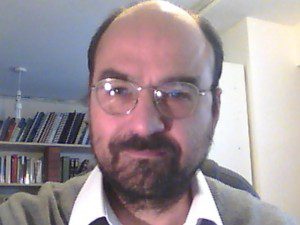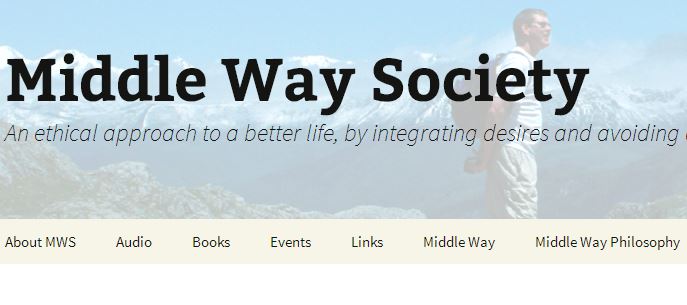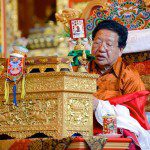Today we’re interviewing Robert M. Ellis, a UK philosopher and formerly ordained Buddhist (in the FWBO, now TBC) about his new undertaking, the Middle Way Society. I have personally been in touch with Robert for a number of years now, having exchanged a few emails back when I began my PhD and moved to London in 2007. Since then we have mostly crossed paths of our blogs and those of fellow Buddhist-philosophy type people, and earlier this year I had the opportunity to meet Robert in person here in Bristol which was a real treat. You may remember him from some comments here or from his guest post “Quiet up!” reviewing/discussing Susan Cane’s book, Quiet. I also wrote about Robert’s talk with Ted Meissner for the Secular Buddhist Association last year here.
Let’s get started.
JW: Let’s begin with an overview of the Middle Way Society. What is it? Who is it?

RME: It’s a new society (a charity) devoted to the understanding and practice of the Middle Way. It was launched in August 2013 by the agreement of the participants in a Middle Way Study Retreat which I led in Malvern. The participants in this retreat had come together initially through the Secular Buddhist movement. However, we wanted to create something rather different from Secular Buddhism, with a clearer philosophical foundation to help us get beyond the religious-secular divide and a greater openness to people from other traditional backgrounds. Seeing the Middle Way as a principle of universal applicability rather than just an aspect of Buddhism, we want to start treating it as such by separating it from the authority of the Buddhist tradition. That doesn’t mean, of course, that we can’t draw on the resources and symbols of the Buddhist tradition, as we could any other.
For a number of years I have been trying to promote Middle Way Philosophy by myself and feeling that I’ve made very limited headway in communicating it. The main problem is the interconnected elements that people need to understand simultaneously and in relation to each other, so it’s very easy for people to dismiss it by just applying their own model and not recognising the ways in which they also need to question other assumptions that they’re making to understand the model I’m using. It has been a great relief to start feeling that I have got across those interconnected elements to some other people who also see its value and are willing to work with me on promoting it. The key other people involved in setting up the Society are Julian Adkins and Barry Daniel.
JW: You’ve had a fascinating path in life. In addition to sending readers to a longer bio, would you like to give a short summary of how you got here?
RME: I came from a Christian (liberal Baptist) background but declared myself an atheist at the age of nine. I first got involved in Buddhism, as well as studying Sanskrit, Pali, Hinduism, Buddhism etc as an undergraduate at Cambridge in the 1980’s, but then I ducked out of Buddhism for a few years before returning to the FWBO (now Triratna) in the mid-90’s. My practical experience of Buddhism shaped my understanding of Western philosophy as I began to engage with it seriously at around the same time, and I particularly became interested in the problem of relativism and how relativism was counter-dependent on absolutism. So I did a Ph.D. in the Philosophy department at Lancaster, avoiding all the scholarly Buddhist Studies stuff and just focusing on how the Middle Way could be brought to bear on the central problem of what objectivity is. Since getting my Ph.D. in 2001 I have felt that it contained some important ideas that I needed to spread, develop and apply. At first I tried doing this in the Triratna Buddhist Order, where I was ordained as Upeksacitta between 2004 and 2008, until I realised that the primary commitment in that Order on balance is to the tradition, not the Middle Way. Since then I have been looking for new ways to move forward with Middle Way Philosophy and share it with others. There’s a longer bio here .
JW: All of your life seems to have brought you to the Middle Way. You write that the Middle Way “is justified only through practical experience.” This sounds more like Aristotle’s phronesis than the Buddhist use of the phrase that readers might be more familiar with. Is it a sort of lived wisdom that one might seek out in great or virtuous people of our time?
RME: I wouldn’t draw such a strong distinction between Buddhism and Aristotle. If we take the life of the Buddha before his enlightenment as an indication, the Buddha engaged with the Middle Way through practical experience too. Both Aristotle and the Buddha were also apparently committed to metaphysical ideas as well though, which limited the clarity of their accounts of the Middle Way even though they offer important insights. I wouldn’t reduce the Middle Way to virtue ethics or to the imitation of great people, no, though there’s no reason why we shouldn’t use great people as inspiration if we also treat them critically. The Middle Way is a principle of balanced judgement by which a positive appreciation of any person can co-exist with a critical appreciation of their limitations. It’s not about idealising people, and that’s one aspect of the Buddhist tradition I’d particularly like to move away from.
JW: Elsewhere you write that “The underlying, important, and universal point offered by the Middle Way is that metaphysical beliefs and their denial need to be avoided in order to make progress in addressing conditions. It is not just that metaphysical beliefs are a bit of a distraction: they are actually damaging because they rigidify our positions and stop us responding to new information in experience… The definition of a metaphysical belief, however, is a matter of controversy.”
How do we get to the core of our metaphysical beliefs? Is this something we need to start with on day one, perhaps with the help of a guide? Or is it the culmination of a long process?
RME: I don’t think metaphysical beliefs have a ‘core’. They can be defined by their functions – as beliefs that are dualistic, representational, absolute, apparently infallible, repressive and group-oriented. They need to be firmly put in their place as just one set of beliefs, along with many practical beliefs based on experience that everyone has. They tend to hugely over-rate themselves as motivators of action, but because of their absolute nature they are actually irrelevant to most of our actions in practical experience. The problems arise when we take them seriously and use them as an absolute source of justification. Our beliefs then get a deluded quality of certainty that leads us to act without awareness of conditions. Far from having a ‘core’, they are incredibly shallow, like braggarts with no experience to back them up. Like braggarts, they are also in conflict with each other.
Weakening our attachment to metaphysical beliefs is a long process that needs to be seen incrementally. Yes, it starts on day one, but then it continues indefinitely. We won’t necessarily get rid of them, but we can sideline them gradually by rechanneling the energy that is committed to them. That is the process of integration, which is the other important model used in Middle Way Philosophy alongside that of the Middle Way itself.
JW: One of my favourite posts on your new site is the one on the West-Eastern Divan Orchestra (in part because I’m a big Beethoven fan, but also because it features young people coming together under a common project, learning from one another, breaking down preconceptions and barriers, etc). As you write, “A shared meaning based on music at least creates the conditions in which young people on different sides of the divide begin to talk to each other, and to recognise the meaningfulness of each others’ perspectives.” Returning a bit to the first question, do you have any other projects like this that you would like to develop or promote with the Middle Way Society?
RME: The orchestra is just an example of the Middle Way in action. There are a great many other areas of practice where it is or could be, in the sense that the Middle Way can help explain the value of the practice without either absolutism or relativism, and how a balancing element is central to the success of the practice. For example: meditation, psycho-therapies of all kinds such as CBT, mediation techniques, the arts, critical thinking and reflection. I think which of these practices, or specific instances of them, we promote most is just dependent on the experience of the people involved. My own interests lie particularly in practising and promoting critical thinking and the value of arts such as music and creative writing. I’m also very interested in practical ethics and politics. The key point is just that whatever integrative practices fit your life, you can see how the Middle Way gives them a theoretical basis.
JW: Beyond specific projects, what are your goals for the society in the months or years to come? And how can people get involved?
RME: Of course I hope that we’ll grow, and despite starting in the UK quickly get an international profile. I’m less interested in the kind of superficial involvement that can be measured in number of Facebook ‘likes’ than I am in having people involved who develop a sense of community and seriously engage with the ideas and the practices. I want us to develop offline as well as online, through talks, groups and retreats. We already have our main retreat for 2014 fixed up, which will take place for a week in August in the Worcestershire countryside. People can get involved first by engaging with the ideas, on the website and though my books, by interacting with others on the website, and by joining the society or subscribing to our free email list. Just take a look at http://www.middlewaysociety.org and these options should be clear. But what I would value most in the long-term is people signing up for the retreat and being prepared to study the Middle Way in depth and reach an understanding of what it has to offer.
JW: Any last thoughts or words you would like to add?
Some final thoughts for Buddhists, whom I take to be the main readers of your blog. I think it’s high time we started taking the Middle Way seriously. The Buddhist tradition pays lip-service to it, but in practice it struggles in competition with traditional dogmas and idealised authorities, even in relatively liberal Western groups like Triratna. The Secular Buddhists in some ways seem to be looking for a principle that can combine the insights of science with those of Buddhism, but the American branch has almost completely ignored the Middle Way and gone down a Secular Naturalist path instead – one based on negative metaphysical assumptions and that can give us no coherent account of the ethical dimension of the path.
The Middle Way is not just my account of it: the Society involves inviting others to help me develop an increasingly coherent account of what the Middle Way means. However, it does mean taking it seriously rather than ignoring it. I think it’s a scandal that Buddhism has so much neglected this principle that it gave birth to. Don’t ask the scholastic question “Is this really the Middle Way of the Buddha?”; instead ask “Is this point of balance the crucial insight that helps me make the right judgements in meditation, in ethics, in every aspect of my life?”













